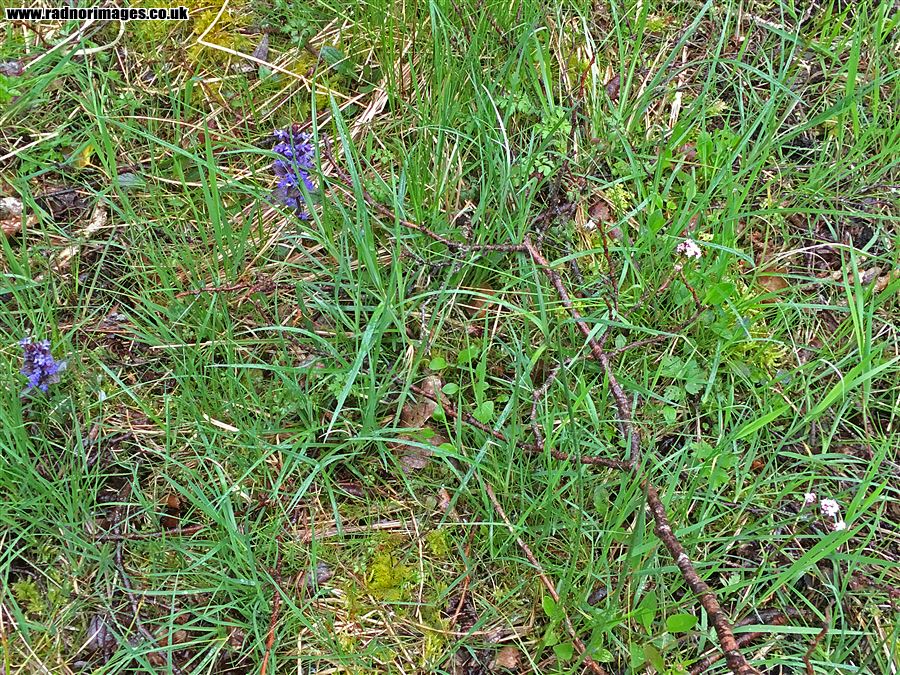The first was to the important woodland opposite Darren Fawr Reserve, where we found the Hutchinsia a week or two ago, particularly to see the Lime Coppice Stools there and try to find Dog's Mercury (yes!) which was mentioned as a characteristic plant of the woodland by Oliver Rackham but is (surprise to me) relatively rare in the area. It certainly is, as I found when I investigated past records, with only 9 scattered records for all time in the 10 km square. Sometimes the surprises in the recording lark are with species you dismiss with "that again"!
The woodland, Penmoelallt, is also host to rare Sorbus species but we weren't seeking them out on this occasion.
We were greeted at the car parking by a display of a rare archaeophyte species for the county:
Fairy Foxglove,
Clychau’r tylwyth teg
or
Erinus alpinus
The evident losses from Ash-die back were sad to see. Lots of regeneration - lets hope some are resistant...
We found four in all of these old Limes
Small-leaved Lime,
Pisgwydden dail bach
or
Tilia cordata - or possibly its hybrid with Large-leaved Lime - tbc
Towards the north of the woodland Wild Garlic became dominant - even under planted Beech. This picture was taken just at the start of the swards.
Ramsons,
Wild Garlic,
Craf y geifr
or
Allium ursinum
I didn't photograph the Dog's Mercury, Bresychen y cŵn or Mercurialis perennis but it was there - in quite some abundance albeit in patches.
At lunch I was able to photograph / record some Yew on Darren Fawr opposite us.
Yew,
Ywen
or
Taxus baccata
And right at the top of the hill we saw a lot of this (after wading through Wild Garlic up the steep slope):
Smooth Lady's-mantle,
Mantell-Fair lefn
or
Alchemilla glabra
----------------------------------------------------------------------------------------------
Then to some lanes and public right of way paths near Hay taking us through an area where Green-winged Orchid used to grow. We found superb habitat but alas no orchids any more.
Including a new site for :
Meadow Saffron,
Saffrwm y ddôl
or
Colchicum autumnale
It is common in the area though - apparently only since the Second World War when it is reported to have been grown commercially (for Colchicine while supplies from Turkey were cut off?)
And:
Meadow Saxifrage,
Tormaen y gweunydd
or
Saxifraga granulata
Which was a first for the member of the group who found it.
Nearby we found:
Alternate-leaved Golden-saxifrage,
Eglyn bob yn eilddail
or
Chrysosplenium alternifolium
(Not a new record it turns out but an update and we were pleased with ourselves spotting the leaves.)
A newly dug pond in a wet area of meadow - we are looking at the Sedge in the next picture which is undoubtedly introduced.
Greater Pond-sedge,
Hesgen-y-dŵr fawr
or
Carex riparia
----------------------------------------------------------------------------------------------
The last outing was to record a neglected square near Libanus, check out the graveyard there and look at a local farm's woodland.
The neglected square had this strange bridge:
Scarlet Pimpernel,
Llysiau'r cryman
or
Anagallis arvensis
- at Libanus graveyard. The only known site for this is the 10km square and still there from 1998.

I appreciated the mix of Bugle and Marsh Valerian at the woodland:
There was also abundant Bird Cherry around the farm, and a patch of a close relative of the sedge from the day before - this time native I am sure. (Lesser Pond-sedge,
Hesgen-y-dŵr fach
or
Carex acutiformis.)
----------------------------------------------------------------------------------------------
'Certainly interesting in that there are three white ones visible in a small area. They more normally occur at a rate of say one per ten square metres and are just a genetic variant of the English Bluebell. Spanish Bluebells hold their bells upward and the hybrid is in between and more robust. It is a curious aspect of academic botany that flower colour is often dismissed as a character – all the most comprehensive British Flora has to say about these variants is “rarely pink or white”.'
And to reinfoce the point - anything unusual you spot in Brecknock (botanically!) is of interest to me!

















No comments:
Post a Comment